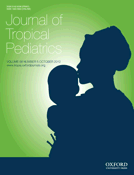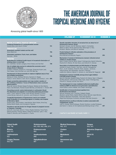
TROPICAL BIOMEDICINE
Scope & Guideline
Advancing knowledge in tropical health.
Introduction
Aims and Scopes
- Tropical Infectious Diseases:
The journal focuses on the epidemiology, diagnosis, treatment, and prevention of infectious diseases endemic to tropical regions, such as malaria, dengue, and leishmaniasis. - Parasitology:
A significant area of research includes the study of parasites affecting humans and animals, with an emphasis on their biology, transmission dynamics, and control measures. - Phytochemistry and Natural Products:
Research on the bioactive compounds from plants, their medicinal properties, and potential applications in treating tropical diseases is a core aspect of the journal. - Molecular Biology and Genetics:
The journal publishes studies involving molecular techniques for the identification and characterization of pathogens, as well as genetic research related to disease susceptibility and resistance. - Public Health and Epidemiology:
It addresses public health issues, including disease outbreaks, health interventions, and the socio-economic factors influencing health in tropical regions. - Veterinary Medicine and Zoonoses:
The journal also covers veterinary sciences, focusing on zoonotic diseases and their implications for human health, emphasizing the interconnection between animal and human health.
Trending and Emerging
- Genomic and Bioinformatics Approaches:
There is an increasing trend in the use of genomic sequencing and bioinformatics for understanding pathogen diversity, drug resistance, and vaccine development. - Impact of Climate Change on Infectious Diseases:
Research exploring how climate change affects the spread and dynamics of infectious diseases is gaining traction, highlighting the need to address environmental factors in disease prevention. - Post-COVID Complications and Research:
Studies focusing on the long-term effects of COVID-19, including post-viral syndromes and their interactions with existing tropical diseases, are emerging as a significant area of interest. - Immunotherapy and Vaccine Development:
Innovative vaccine strategies and immunotherapeutic approaches for tropical diseases are increasingly emphasized, reflecting a global push towards enhanced disease prevention. - One Health Approach:
The integration of human, animal, and environmental health research is becoming more prominent, underscoring the interconnectedness of health issues in tropical regions.
Declining or Waning
- Traditional Medicine:
Research focusing on traditional remedies and practices has decreased, possibly due to a shift towards evidence-based medicine and the integration of modern therapeutic approaches. - Non-communicable Diseases:
Although still relevant, the emphasis on non-communicable diseases like diabetes and hypertension in tropical settings has diminished compared to infectious diseases that are more prevalent. - Historical Perspectives on Tropical Diseases:
Papers exploring historical accounts of tropical diseases or traditional epidemiological studies have become less common, indicating a preference for contemporary research and methodologies. - Entomological Studies:
Although still important, dedicated studies on insect vectors, particularly those not directly linked to emerging diseases, have seen a reduction in favor of more targeted research on specific vector-borne diseases.
Similar Journals

JOURNAL OF TROPICAL PEDIATRICS
Championing advancements in tropical pediatric care.JOURNAL OF TROPICAL PEDIATRICS, published by Oxford University Press, stands as a critical platform for the dissemination of research and clinical advancements in the field of tropical pediatrics. With a rich history dating back to 1955, this journal serves as a significant contributor to our understanding of health issues affecting children in tropical and subtropical regions, focusing on infectious diseases, pediatric care, and child health. It currently holds an impressive Q2 ranking in three categories: Infectious Diseases, Medicine (miscellaneous), and Pediatrics, Perinatology and Child Health, placing it among the top journals in its field. Featuring both formative research and applied studies, the journal aims to address the unique challenges posed by pediatric care in tropical environments. Its inclusion in an esteemed database ensures a broad dissemination of critical knowledge to researchers, healthcare professionals, and students alike, promoting a collaborative approach to improving child health outcomes globally.

Journal of Tropical Meteorology
Connecting Scholars to Unravel Tropical Meteorological MysteriesJournal of Tropical Meteorology, published by JOURNAL OF TROPICAL METEOROLOGICAL PRESS, is a leading scholarly journal dedicated to advancing the understanding of atmospheric phenomena and meteorological patterns in tropical regions. With an ISSN of 1006-8775, this journal plays a vital role in disseminating high-quality research, focusing on critical issues such as climate variability, weather forecasting, and tropical cyclone dynamics. The journal, which is indexed in Scopus with a respectable rank in the low quartile of Q3 in Atmospheric Science, aims to provide a platform for researchers and professionals to share groundbreaking insights and foster collaboration within the scientific community. Although it follows a traditional access model, the Journal of Tropical Meteorology encourages submissions from a diverse range of disciplines, thus enriching the field with a variety of perspectives. By bridging theory and practical applications, this journal serves as an essential resource for students, researchers, and practitioners striving to expand their knowledge and contribute to the global conversation on meteorology.

ENFERMEDADES INFECCIOSAS Y MICROBIOLOGIA CLINICA
Advancing knowledge in infectious diseases and clinical microbiology.ENFERMEDADES INFECCIOSAS Y MICROBIOLOGIA CLINICA is a prominent journal dedicated to the fields of infectious diseases and clinical microbiology, published by EDICIONES DOYMA S A in Spain. With an ISSN of 0213-005X and an e-ISSN of 1578-1852, the journal has been a cornerstone of research and scholarly communication since its inception in 1989. As of 2023, it holds a Q3 category ranking in Infectious Diseases, highlighting its significance in the field, alongside a Q4 ranking in the related area of Microbiology. Although the journal is not open access, it remains an essential resource for professionals, researchers, and students aiming to stay informed on advancements and studies that impact clinical practices in infectious diseases. With Scopus ranks indicating a percentile ranking in the 20th to 34th range across various sub-disciplines, ENFERMEDADES INFECCIOSAS Y MICROBIOLOGIA CLINICA continually contributes to the dialogue and development of science, fostering a deeper understanding of complex microbial interactions and disease mechanisms.

AMERICAN JOURNAL OF TROPICAL MEDICINE AND HYGIENE
Fostering collaboration for a healthier world.The American Journal of Tropical Medicine and Hygiene, published by the American Society of Tropical Medicine & Hygiene, serves as a pivotal platform for the dissemination of innovative research and clinical findings in the realm of tropical medicine and health. With an illustrious history dating back to 1945, this journal has maintained its commitment to enhancing global health, particularly in the fields of Infectious Diseases, Parasitology, and Virology. It currently boasts an impressive impact factor and ranks in the Q1 category for Parasitology and Q2 for Infectious Diseases and Medicine (miscellaneous), highlighting its academic prominence. The journal's mission is to advance research, showcase cutting-edge studies, and foster collaboration among researchers, healthcare professionals, and students dedicated to tackling tropical diseases and improving public health worldwide. While access is not open, the journal remains a critical resource for anyone looking to stay informed on the latest advancements in the field.

ACTA VETERINARIA-BEOGRAD
Connecting global insights in veterinary studies.ACTA VETERINARIA-BEOGRAD is a distinguished academic journal dedicated to the field of veterinary science, focusing on a broad spectrum of topics pertinent to veterinary medicine and animal health. Published by SCIENDO, this journal has been an open-access resource since 2014, facilitating the dissemination of valuable research findings and innovations to a global audience. With an ISSN of 0567-8315 and an E-ISSN of 1820-7448, it plays a critical role in promoting accessible knowledge in veterinary practices while contributing to the advancement of the field. Located in Poland, this journal notably ranks in the Q3 quartile for veterinary studies, reflecting its ongoing commitment to quality and relevance. The journal welcomes contributions from a diverse range of veterinary disciplines, making it a vital platform for researchers, practitioners, and students alike who aspire to advance their understanding and impact within the veterinary community.

Tropical Animal Science Journal
Empowering Researchers in Tropical Animal HealthTropical Animal Science Journal, ISSN 2615-787X, E-ISSN 2615-790X, is an esteemed open-access journal published by the Bogor Agricultural University, Faculty of Animal Science. Launched in 2018, this journal serves as a pivotal platform for disseminating high-quality research in the fields of Animal Science, Food Animals, and Veterinary Medicine. With its significant presence in Indonesia and a commitment to scientific innovation, it has achieved a Q3 ranking in Animal Science and Zoology and Food Animals, as well as a Q2 ranking in Veterinary (miscellaneous) as of 2023. The journal also enjoys favorable Scopus rankings, placing it in the 61st percentile for General Veterinary and demonstrating its relevance and impact in the academic community. As an advocate for open-access publishing since its inception, the journal enhances accessibility to critical research findings, making it an invaluable resource for researchers, professionals, and students alike who aim to advance their knowledge and contribute to the fields of tropical animal science.

Current Tropical Medicine Reports
Innovating solutions for global health challenges.Current Tropical Medicine Reports, published by Springer, is an esteemed journal that serves as a pivotal platform for researchers, professionals, and students in the fields of immunology, allergy, and infectious diseases. With a strong focus on emerging tropical medicine topics, the journal provides an authoritative avenue for disseminating innovative research and practical insights, showcasing its commitment to advancing global health knowledge. Now in its convergence years from 2014 to 2024, it has successfully established itself in the academic community, evidenced by its Q2 rankings in the categories of Infectious Diseases and Immunology and Allergy in 2023, reflecting its impact and relevance. The journal boasts impressive Scopus rankings, holding the 50th position in Infectious Diseases and 55th in Immunology and Allergy, further underscoring its significance in these critical fields. While it operates under a subscription model, the journal serves not only as a resource for published research but also as a catalyst for collaboration and knowledge exchange among the scientific community. With a growing readership, Current Tropical Medicine Reports is poised to continue shaping the discourse surrounding tropical health challenges.

Journal of Infection in Developing Countries
Exploring challenges and solutions in developing nations.Journal of Infection in Developing Countries, published by J INFECTION DEVELOPING COUNTRIES, is a premier open-access journal dedicated to advancing research in the fields of infectious diseases, microbiology, parasitology, and virology, particularly within the context of developing nations. Established in 2007 and actively disseminating knowledge since 2008, this journal aims to bridge the gap between researchers and practitioners by providing a platform for high-quality, peer-reviewed articles that address the unique challenges faced in these regions. With an ISSN of 1972-2680 and a robust HIndex showcasing its growing influence, JIDC has attained a Q3 category ranking in several disciplines as of 2023, indicating its crucial role in shaping ongoing discourse in public health. As an open-access publication, it ensures that vital research is accessible to all, fostering collaboration and innovation in infectious disease management and control.

Tropical Life Sciences Research
Unveiling Innovations in Tropical Life SciencesTropical Life Sciences Research, published by PENERBIT UNIVERSITI SAINS MALAYSIA, is an esteemed open-access journal dedicated to the realms of Agricultural and Biological Sciences, Biochemistry, Genetics, and Molecular Biology, and Medicine. Since its inception in 2006, this journal has established itself as a significant platform for disseminating high-quality research findings that contribute to the understanding of tropical biodiversity and health-related issues. With its innovative approach, Tropical Life Sciences Research has garnered an impressive impact factor, reflecting its influence in the academic community; it is ranked Q2 in Agricultural and Biological Sciences and Q3 in both Biochemistry and Medicine categories as of 2023. Researchers and professionals can access a wealth of knowledge through this journal, whose content spans from 2009 to 2024, making it a vital resource for students and experts alike interested in advancing the science of tropical ecosystems and health. The journal also stands out for its comprehensive Scopus rankings, indicating its relevance and quality in the competitive academic landscape.

MEMORIAS DO INSTITUTO OSWALDO CRUZ
Empowering Scholars with Open-Access Medical Discoveries.MEMORIAS DO INSTITUTO OSWALDO CRUZ, published by the esteemed FUNDACO OSWALDO CRUZ in Brazil, serves as a vital platform for the dissemination of research in the fields of medicine and microbiology. With its inception dating back to 1909 as an open-access journal, it has made significant strides in promoting the understanding of health-related topics and infectious diseases across its diverse readership. This journal is recognized for its contribution to the scholarly community, boasting a Q2 category in Medicine (miscellaneous) and a Q3 rating in Microbiology (medical) as per the 2023 quartiles. Located in Rio de Janeiro, the journal not only embraces a rich historical context but also engages with contemporary issues in public health. Researchers and professionals in related fields will find valuable insights and data that underscore the significance of scientific collaboration in tackling global health challenges. With access to its archives spanning multiple decades, MEMORIAS DO INSTITUTO OSWALDO CRUZ remains a key resource for students and researchers alike as they endeavor to expand their knowledge and contribute to future innovations in health science.